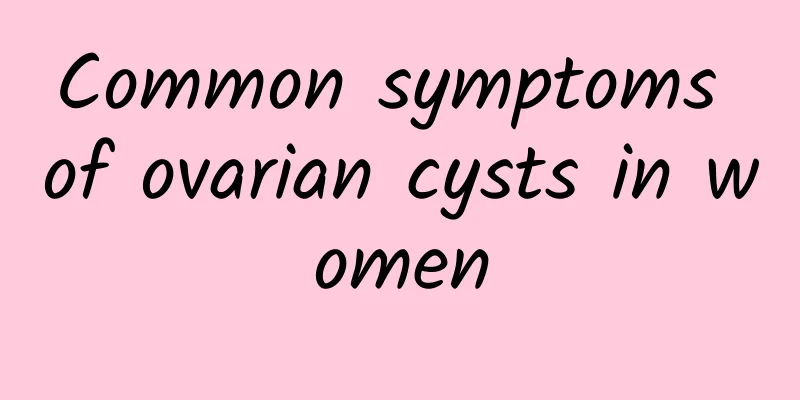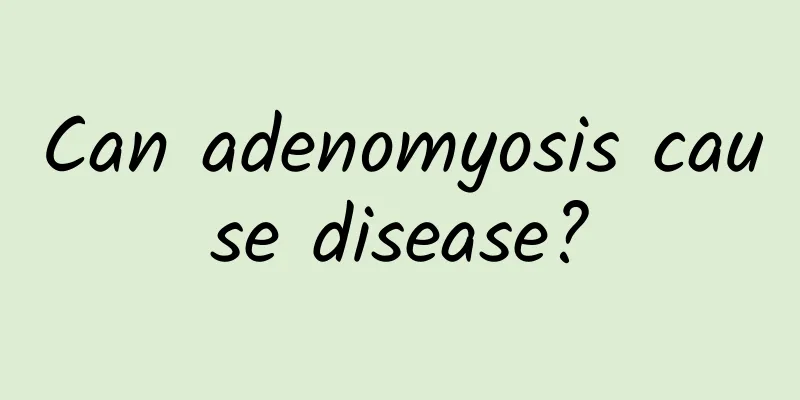Common symptoms of ovarian cysts in women

|
Ovarian cysts are common benign gynecological tumors. The disease has no obvious symptoms in the early stage and is easy to be ignored. Therefore, understanding the symptoms of ovarian cysts can help you detect ovarian cysts in time. So what are the symptoms of ovarian cysts ? The following is a detailed answer from relevant experts. 1. Increased abdominal circumference and abdominal tumors This is the most common complaint. The patient notices that her clothes or belt seem too tight, and she just noticed that her abdomen is enlarged, or she feels it by chance in the morning, so she presses her abdomen and finds a mass in the abdomen, plus she feels bloated and uncomfortable. This is a common symptom of ovarian cysts. 2. Menstrual disorders Generally, ovarian cysts, even bilateral ovarian cysts, do not cause menstrual disorders because they do not destroy all normal ovarian tissues. Some uterine bleeding is not endocrine, but may be caused by ovarian tumors that change the pelvic blood vessels, causing endometrial congestion; or by ovarian malignant tumors that directly metastasize to the endometrium. Menstrual disorders caused by endocrine tumors are often combined with other secretory effects. 3. Discomfort in the lower abdomen It is the initial symptom before the patient feels a lower abdominal mass. Due to the weight of the tumor itself and the influence of intestinal peristalsis and body position changes, the tumor moves in the pelvic cavity, pulling on its pedicle and pelvic funnel ligament, causing the patient to feel fullness and falling in the lower abdomen or iliac fossa. This is also one of the symptoms of ovarian cysts. 4. Compression symptoms Huge ovarian tumors can cause dyspnea and palpitations due to compression of the diaphragm. Ovarian tumors combined with a large amount of ascites can also cause these symptoms. However, the dyspnea of some ovarian tumor patients is caused by unilateral or bilateral pleural effusion, and is often combined with ascites, forming the so-called Meigs syndrome. The above is an introduction to the symptoms of ovarian cysts. If you experience the above symptoms, you must go to the hospital for treatment in time. If you want to know more about ovarian cysts, please consult an online expert. |
<<: Experts explain the causes of ovarian cysts in women
>>: Experts analyze the precautions for women after abortion
Recommend
Drink it and you won’t get fat! 5 smart ways to drink wine
As clothes become thinner, you are often forced t...
[Video version] This exercise is essential to increase immunity during the epidemic!
Although the COVID-19 epidemic has slowed down, e...
Prevention of cervical erosion
Currently, the most common cervical erosion in cl...
Eat this in the summer! Buckwheat noodles help burn fat and lose weight
The weather is hot and you want something refresh...
What should I do if I have irregular menstruation during menopause? 4 things to pay attention to when women have irregular menstruation during menopause
Menopause Irregular Menstruation Menopause is a s...
What should I do if my menstrual period is still dark brown after more than a month?
What should I do if my menstrual period has not s...
Cervical hypertrophy after spontaneous abortion
Cervical hypertrophy after spontaneous abortion m...
What foods should I eat if I have cervical warts?
Cervical warts are a very common disease nowadays...
What are the preventive measures for irregular menstruation?
What are the preventive measures for irregular me...
What is Ⅲ degree cervical erosion? Medical definition of Ⅲ degree cervical erosion
Grade III cervical erosion is actually the most s...
Causes and prevention of cervical erosion
The main causes of cervical erosion include chron...
Experts explain the precautions for painless abortion in winter
It is very necessary for women who have unexpecte...
Can uterine fibroids be inherited by the next generation?
Will uterine fibroids be inherited by the next ge...
How to diagnose bacterial vaginosis
Bacterial vaginosis catches us off guard. The men...
Experts describe the early symptoms of adnexitis
The incidence of adnexitis is increasing in life....









